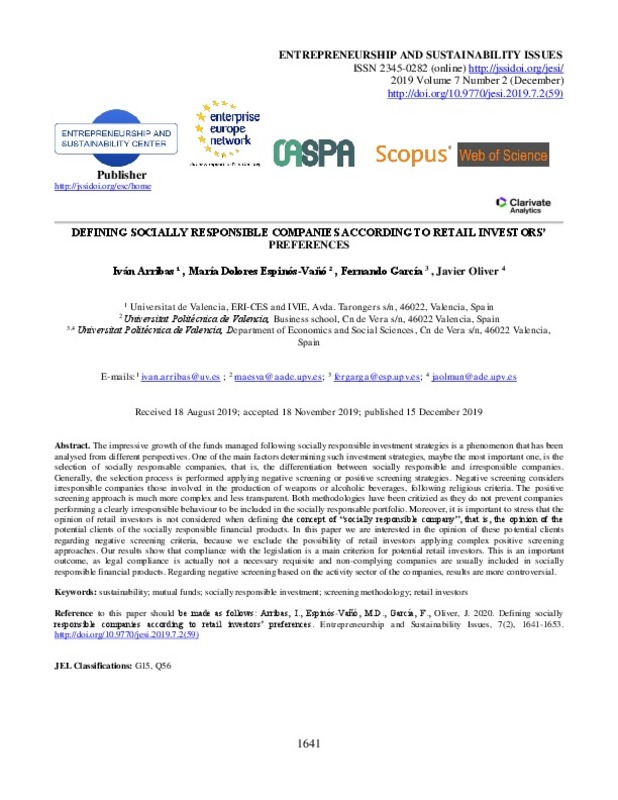JavaScript is disabled for your browser. Some features of this site may not work without it.
Buscar en RiuNet
Listar
Mi cuenta
Estadísticas
Ayuda RiuNet
Admin. UPV
Defining socially responsible companies according to retail investors' preferences
Mostrar el registro sencillo del ítem
Ficheros en el ítem
| dc.contributor.author | Arribas, Iván
|
es_ES |
| dc.contributor.author | Espinós-Vañó, María Dolores
|
es_ES |
| dc.contributor.author | García García, Fernando
|
es_ES |
| dc.contributor.author | Oliver-Muncharaz, Javier
|
es_ES |
| dc.date.accessioned | 2020-12-02T04:31:30Z | |
| dc.date.available | 2020-12-02T04:31:30Z | |
| dc.date.issued | 2019-09 | es_ES |
| dc.identifier.uri | http://hdl.handle.net/10251/156259 | |
| dc.description.abstract | [EN] The impressive growth of the funds managed following socially responsible investment strategies is a phenomenon that has been analysed from different perspectives. One of the main factors determining such investment strategies, maybe the most important one, is the selection of socially responsable companies, that is, the differentiation between socially responsible and irresponsible companies. Generally, the selection process is performed applying negative screening or positive screening strategies. Negative screening considers irresponsible companies those involved in the production of weapons or alcoholic beverages, following religious criteria. The positive screening approach is much more complex and less transparent. Both methodologies have been critizied as they do not prevent companies performing a clearly irresponsible behaviour to be included in the socially responsable portfolio. Moreover, it is important to stress that the opinion of retail investors is not considered when defining the concept of "socially responsible company", that is, the opinion of the potential clients of the socially responsible financial products. In this paper we are interested in the opinion of these potential clients regarding negative screening criteria, because we exclude the possibility of retail investors applying complex positive screening approaches. Our results show that compliance with the legislation is a main criterion for potential retail investors. This is an important outcome, as legal compliance is actually not a necessary requisite and non-complying companies are usually included in socially responsible financial products. Regarding negative screening based on the activity sector of the companies, results are more controversial. | es_ES |
| dc.language | Inglés | es_ES |
| dc.publisher | Enterpreneurship and Sustainability Center | es_ES |
| dc.relation.ispartof | Enterpreneurship and Sustainability Issues | es_ES |
| dc.rights | Reconocimiento (by) | es_ES |
| dc.subject | Sustainability | es_ES |
| dc.subject | Mutual funds | es_ES |
| dc.subject | Socially responsible investment | es_ES |
| dc.subject | Screening methodology | es_ES |
| dc.subject | Retail investors | es_ES |
| dc.subject.classification | ECONOMIA FINANCIERA Y CONTABILIDAD | es_ES |
| dc.title | Defining socially responsible companies according to retail investors' preferences | es_ES |
| dc.type | Artículo | es_ES |
| dc.identifier.doi | 10.9770/jesi.2019.7.2(59) | es_ES |
| dc.rights.accessRights | Abierto | es_ES |
| dc.contributor.affiliation | Universitat Politècnica de València. Departamento de Economía y Ciencias Sociales - Departament d'Economia i Ciències Socials | es_ES |
| dc.description.bibliographicCitation | Arribas, I.; Espinós-Vañó, MD.; García García, F.; Oliver-Muncharaz, J. (2019). Defining socially responsible companies according to retail investors' preferences. Enterpreneurship and Sustainability Issues. 7(2):1641-1653. https://doi.org/10.9770/jesi.2019.7.2(59) | es_ES |
| dc.description.accrualMethod | S | es_ES |
| dc.relation.publisherversion | https://doi.org/10.9770/jesi.2019.7.2(59) | es_ES |
| dc.description.upvformatpinicio | 1641 | es_ES |
| dc.description.upvformatpfin | 1653 | es_ES |
| dc.type.version | info:eu-repo/semantics/publishedVersion | es_ES |
| dc.description.volume | 7 | es_ES |
| dc.description.issue | 2 | es_ES |
| dc.identifier.eissn | 2345-0282 | es_ES |
| dc.relation.pasarela | S\401723 | es_ES |
| dc.subject.ods | 12.- Garantizar las pautas de consumo y de producción sostenibles | es_ES |








